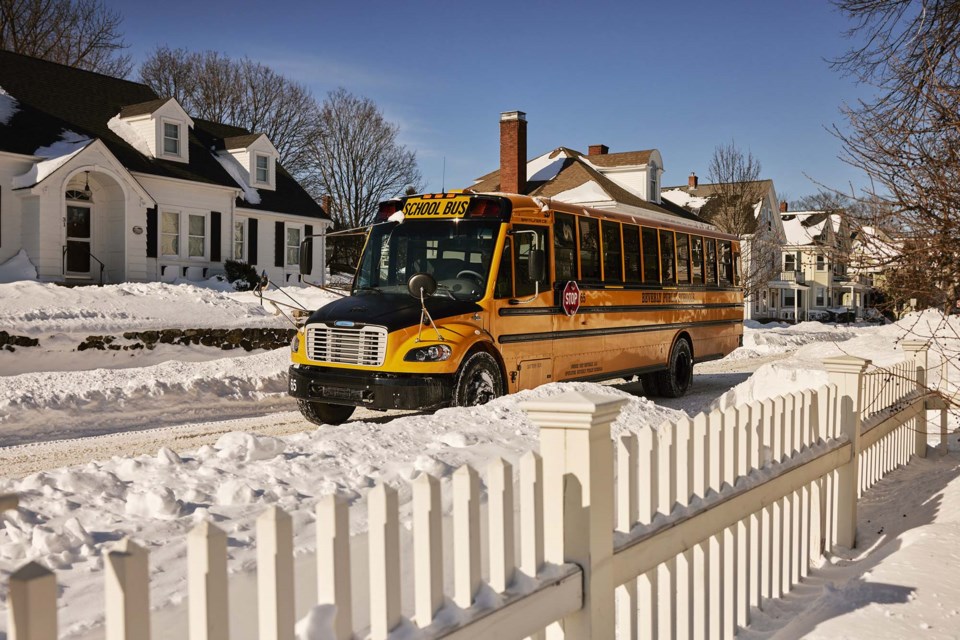The federal government and a Boston transportation company have teamed up to put five electric school buses onto St. Albert’s streets.
Federal Tourism Minister Randy Boissonnault and Highland Electric Fleets CEO Duncan McIntyre announced March 23 that they were spending about $2.9 million to buy five electric school buses and charging stations for those buses for the St. Albert Public School Division.
About $1.3 million of this cash comes from the federal Zero Emissions Transit Fund, with the rest sourced from Highland. This was the first time that the transit fund had been used to purchase electric school buses.
“These new electric buses will help bring students to school and back while reducing greenhouse gas emissions and supporting our efforts to achieve net-zero emissions by 2050,” Boissonnault said a media release.
St. Albert Public has wanted to buy electric buses for many years but until recently was unable to secure the necessary funding, said board chair Kim Armstrong. The board recently agreed to have Highland provide the buses, with Highland in turn applying for the federal grant.
“We’re very committed to environmental initiatives,” Armstrong said, and these buses will let the board teach by example when it comes to sustainable living.
The deal will see the district replace five of its 40 diesel buses with electric ones, said St. Albert Public spokesperson Paula Power. Cunningham Transport will drive and host the buses, which would likely service all the board’s schools.
Armstrong said the board plans to test-drive the buses for about five years to evaluate their costs and performance. The board’s urban nature and triple-run bus routes (where each bus visits three schools per outing) made it an ideal place for an electric bus pilot project.
Green wheels on the bus
McIntyre said his Boston-based company is a for-profit enterprise that helps school boards get financing to field electric buses.
McIntyre said a school bus is a great candidate for electrification since it typically travels less than 160 km a day (well within the range of most electric vehicles) and starts and ends its trips at the same place (which makes it easier to decide where to put your chargers). Highland plans to install three Level 3 DC fast charging stations at the Cunningham Transport yard to power its St. Albert buses. Electric buses also often have the same drivers day-to-day, which makes training easier.
McIntyre said electric buses have three times the capital cost of conventional ones but about half the operating costs due to lower fuel and maintenance needs.
“There’s no emissions, no tailpipe at all on an electric bus,” he continued, and no pipes spewing out diesel fumes in kids’ faces as they walk past the bus.
A September 2022 study by the World Resources Institute found that electric school buses produced 38 to 76 per cent fewer greenhouse gas emissions per mile over their lifetime than diesel or propane ones in the U.S., depending on the source of the electricity. Data from Highland suggests their electric buses produce 164 tonnes fewer CO2 emissions than diesel ones after 100,000 miles. McIntyre said Highland hoped to power the St. Albert buses with renewable energy.
McIntyre said electric bus drivers say they often have a much quieter ride because their passengers no longer have to shout over the roar of the engine.
“We have found the kids absolutely love them,” McIntyre said of the buses, with some likening rides on them to “floating on a magic carpet.”
McIntyre said some communities have started using their buses as portable batteries to store renewable electricity or provide backup power.
McIntyre said Highland has yet to determine which company will provide St. Albert Public’s buses. Most manufacturers field 70-passenger buses that get about 210 kilometres per charge.
The new buses are expected to arrive sometime this winter and could be on the road by January 2024, Power said.




